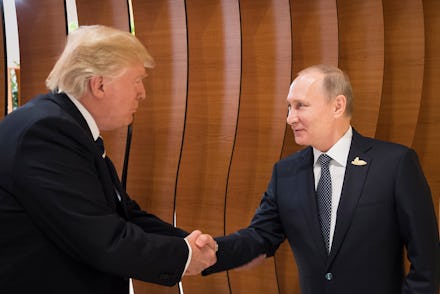Russia may have used Facebook to influence the 2016 election. That’s a page from the US playbook.

If a bombshell report on Russia, Facebook and the 2016 election had you clutching your pearls, you may want to loosen your grip.
That report, published Wednesday in the Washington Post, revealed that Facebook officials told congressional investigators that $100,000 in Facebook advertising had been purchased by a so-called Russian “troll farm” with a history of peddling pro-Kremlin propaganda. According to the Post, the Russian troll farm used the six-figure advertising spend in a concerted effort to target would-be voters in the lead-up to the 2016 election.
Some of those ads, the Post reported, even mentioned presidential candidates Donald Trump and Hillary Clinton by name. According to the Associated Press, the rest may have mentioned divisive political issues like gun control and race.
Since its Wednesday publication, the revelation of Facebook’s possible role in President Donald Trump’s upset victory in the 2016 election ignited a firestorm of outrage across social media and the liberal press.
While it is possible that using Facebook to aggressively and surgically target key swaths of the electorate may have helped give Trump the narrow margin of victory he needed to win the electoral college in 2016, nothing in the Post’s story or the subsequent AP followup confirms whether the alleged pro-Kremlin troll farm did make a significant impact on voters ahead of Election Day.
But if you’re outraged about the possibility that shadowy pro-Kremlin forces used Facebook to influence the U.S. election — and by extension, trigger a seismic shift in the topography of our political landscape — you should know that “weaponizing” social media against our so-called adversaries is a page out of the United States’ own playbook.
An explosive report published by the AP in 2014 details a similar operation funded by the U.S. government under former President Barack Obama. Joe McSpedon, an official for the U.S. Agency of International Development, worked with an international team of contractors in 2010 to create an ersatz social media platform in Cuba that operated through an intricate system of bulk text messages.
Called ZunZuneo — a name that comes from a Cuban word for the sound made by a hummingbird — the Obama-era project had one purpose and one purpose only: triggering an anti-communist, anti-Castro and Washington-friendly “Cuban Spring” that might, as one document obtained by AP put it, “renegotiate the balance of power between the state and society.”
“There will be absolutely no mention of United States government involvement,” one memo said of ZunZuneo. “This is absolutely crucial for the long-term success of the service and to ensure the success of the Mission.”
According to the AP, ZunZuneo was used by 40,000 Cubans at its peak. None of the project’s subscribers — who used the secret network to share potentially transgressive opinions about the news — appeared to be aware that it was created by a foreign body with interest in stirring up dissidents.
Like the alleged Russian project, ZunZuneo’s impact is murky at best. USAID’s Cuban Spring never happened. Skeptics of the impact of Russia’s involvement in Trump’s victory point to a Clinton campaign that, to its detriment, focused on converting suburban Republican strongholds while failing to secure the enclaves of working class whites carried by Obama in the last two elections.